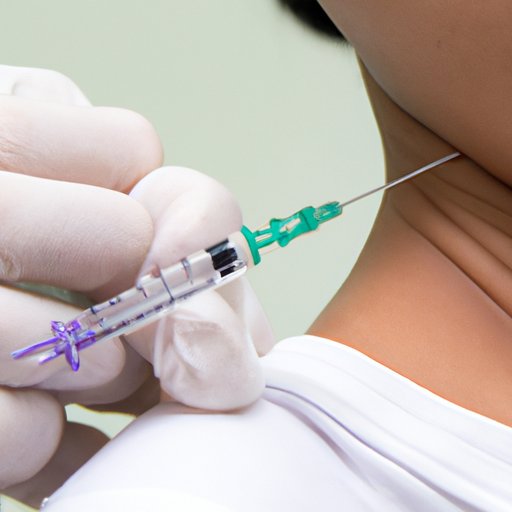
Introduction: Understanding the Importance of Tetanus Shots
Tetanus, or lockjaw, is a serious bacterial infection that affects the nervous system and can lead to muscle stiffness, spasms, and even death. This disease can be prevented by getting a tetanus shot, a vaccine that protects you from the harmful effects of tetanus.
Tetanus shots are crucial in averting this life-threatening infection that attacks the human body and can cause serious harm. Knowing when to get a tetanus shot and how to protect yourself from this illness is essential to your overall health.
The Basics of Tetanus: Risks and Symptoms
Tetanus is caused by Clostridium tetani bacteria that can enter your body through any wound that breaks the skin. The elderly and young children and babies are at a higher risk of getting tetanus and its potentially devastating effects.
The bacteria release a toxin into the body that attacks the nervous system, leading to symptoms such as muscle stiffness, lockjaw, and muscle spasms. As the disease progresses, other symptoms can include difficulty swallowing, fever, sweating, fast heart rate, and elevated blood pressure. In severe cases, tetanus can lead to heart failure and even death.

Stay Safe and Protected: A Comprehensive Guide to Tetanus Shot Scheduling
What is a Tetanus Shot?
A tetanus shot is a type of vaccine that comes in combination with other vaccines such as diphtheria and pertussis (Tdap) or on its own (Td). The tetanus vaccine contains inactivated tetanus toxins that help your body produce immunity to the harmful bacteria that cause the disease.
How often should you get a Tetanus Shot?
The Centers for Disease Control and Prevention (CDC) recommends that everyone get a tetanus shot every ten years.
Who needs Tetanus Shots?
Anyone can get tetanus, but it is especially important for those who have emergency injuries like deep puncture wounds, injuries with objects contaminated with soil, or other injuries that may have exposed the wound to the bacteria. Others who are at especially high-risk of tetanus include the elderly and young children and babies.
What are the Side Effects of Tetanus Shots?
Side effects of tetanus shots are typically mild and short-lasting, and they may include soreness, redness, or swelling at the injection site. Other reactions can include fever, headache, nausea, and muscle or joint pain. In rare cases, allergic reactions to the vaccine can occur, prompting severe coughing, difficulty breathing, or swelling of the face or throat.
Are You Due for a Tetanus Shot? Signs to Look Out For and When to Schedule
Signs and Symptoms That You Need a Tetanus Shot
If you have an injury that breaks the skin, it is important to check with your doctor to see if you need a tetanus shot. The onset of symptoms can take days or weeks, so early treatment is crucial in preventing the spread of the illness.
One should look out for symptoms such as muscle stiffness or tightening, difficulty swallowing, fever, sweating, fast heart rate, and elevated blood pressure.
When to Schedule Your Tetanus Shot
If you are due for a tetanus shot, it is crucial to schedule one as soon as possible to prevent the onset of the bacteria’s harmful symptoms. The best time to get a tetanus shot is within 48 hours of getting a wound or accident that breaks the skin. If you miss getting the vaccine within that time frame, it is best to schedule a shot as soon as possible, even if it’s past the recommended ten year interval.
How to Prepare for Your Tetanus Shot
To prepare for the injection, you should inform your doctor of any allergies or underlying health issues that may affect your immune system. Your doctor may provide medications or vaccines to prepare your body for the tetanus shot’s effects.
The Tetanus Prevention Plan: How Often to Get Vaccinated and What to Know
The Tetanus Prevention Plan
The best way to prevent tetanus is to get vaccinated every ten years, according to the CDC. If you’re due for the vaccine, schedule an appointment to get the shot from a trusted nurse or doctor.
How to Take Care of Yourself After a Tetanus Shot
After getting the tetanus shot, the injection site may feel sore for a few days. Applying a warm compress or taking over-the-counter pain relievers can help soothe the discomfort. Inactive lifestyles can also contribute to soreness, so be sure to move frequently and avoid lying down for prolonged periods.
Tetanus Shots for Emergencies
Tetanus shots are critical in emergencies, as they protect against potential tetanus infection. If you suffer from an injury or severe wound, seek medical help and let your doctor know if you’re up to date with your tetanus shot or if you need to get one.
Protect Yourself From Tetanus: Recommended Schedule and FAQs About the Vaccine
Recommended Schedule for Tetanus Shots
The CDC recommends a ten-year interval for tetanus shots, with additional shots required if the patient has not received the vaccine in a recent ten-year span. If you have not been vaccinated against tetanus, seek medical help immediately after sustaining a wound.
FAQs About the Tetanus Vaccine
Is the tetanus vaccine safe?
Yes, the vaccine is safe and has been used for years without harmful long-term side effects.
Is it possible for someone to contract tetanus after being vaccinated?
It is possible but extremely rare.
Can a tetanus shot cause the disease it is designed to protect against?
No, the vaccine cannot lead to the spread of the disease or infection, as it contains inactivated tetanus toxins.
Controversies Concerning the Tetanus Vaccine
The tetanus vaccine has faced various controversies and myths over the years, causing confusion and mistrust among certain groups of people. Some claim that the vaccine causes severe side effects, including autism or excessive sleeping. However, these claims have no scientific support and are completely unfounded. The tetanus vaccine is a safe and effective way to prevent the harmful effects of tetanus and prevent illness from affecting your life.
Conclusion: Keeping Yourself Safe from Tetanus
By understanding the risks of tetanus and how to prevent it, you can keep yourself safe from this deadly illness. Remember to get vaccinated every ten years, stay alert for any signs of tetanus infection, and seek medical help promptly if you suspect the bacteria has entered your body. Follow these tips, along with proper wound care and personal hygiene, to protect yourself from tetanus and other dangerous infections.





